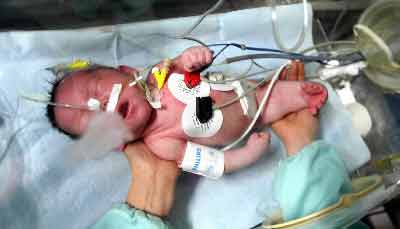"Mermaid" boy in better shape after first opeartion
By Wu Jiao (China Daily)Updated: 2006-11-30 06:30
The chances of survival have brightened for the "mermaid" boy in Hunan Province after the latest surgery, on his intestines.
The infant is now able to drink milk and defecate normally, according to doctors. Earlier, he was fed intravenously.
| |||
His legs, 21 centimetres long, are joined together from thigh to heels, with the feet splayed out and resembling a fish tail.
The boy also suffers from congenital problems, including defects of the intestine and alimentary tract, kidneys and urinary tract, and heart; and underdeveloped genitals and anus.
The condition, known as sirenomelia or mermaid syndrome, occurs in one out of every 70,000 births, according to Ye Zhichun, researcher at the Paediatrics Research Centre in Changsha, the provincial capital.
"The condition is usually fatal within days of birth," said Ye.
With round-the-clock care, the baby is in a stable condition and weighs 2.86 kilograms, 410 grams more than when he was found, said Xu Zhiyue, head of the hospital's intensive care unit.
He is undergoing peritoneal dialysis, which helps clean the blood and remove wastes in case of kidney failure, said Xu.
According to Zhu, the surgery to separate his legs will not be for at least a month; and the most important task now is to keep the boy in a stable condition.
There are only two known survivors of "mermaid syndrome" in the world, both girls. One is Tiffany Yorks, a 17-year-old American whose legs were separated when she was a baby. The other is 2-year-old Peruvian Milagros Cerron, who underwent surgery last year.
According to Zhu, the case of the "mermaid" boy is more complicated than the two girls because he suffers from many dysfunctional organs.
"The operations will be complicated and risky, but we'll try our best," he said.
Surgery on the kidneys, heart and urinary tract will be conducted after separating the legs, said Zhu, adding that the hospital will bear the cost of treatment.
Thousands of people from cross the country have called the hospital to show their concern and offer help.
| ||
|
||
|
||
|
|


